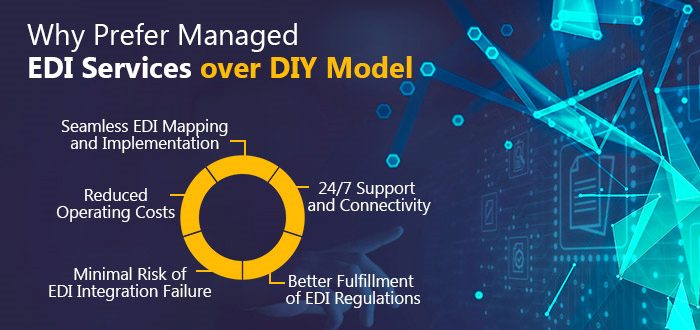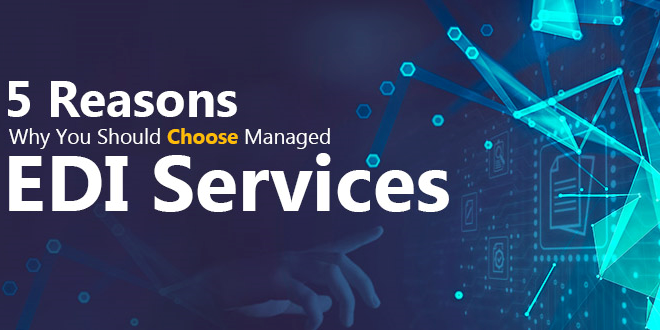When exploring multiple EDI solutions for a seamless exchange of information with trading partners, you need to make multiple choices. Choices (like budget, technology upgrade, manpower, etc.) with respect to EDI solutions so it can benefit you both in the short and long run. The most important choice here is choosing between the do-it-yourself (DIY) model and managed EDI services. Most of the time you think the former could be a better option assuming you will have better control over B2B or EDI data exchanges. But, that’s not entirely true. A managed EDI services provider like A3logics offers better integration tools or solutions you need for smooth information exchange with members of your business ecosystem, including suppliers, customers, and more.
But, many still argue picking one b/w managed services and in-house for EDI should be based on one’s individual choice and resource capabilities. Before we disclose why managed EDI services are better against the DIY approach, let’s start by defining the differences between both of them:
Decoding In-house Vs. Managed EDI

In the case of in-house EDI, a company is responsible for managing the entire technology infrastructure for running and monitoring the EDI operations, from building EDI software, choosing communication standards, defining data types, to ensuring robust IT and technical support. Whereas for managed EDI, all these activities are performed by third-party vendors. No matter how many trading partners you have, or how complex your trading transactions are, these outsourced vendors offer a fully-automated EDI environment, allowing you to focus on your core business without worrying about integration and data transfer issues.
The in-house EDI integration model lets you exercise better control over your business data. The risk associated with third-party data breaches, cloud downtime, and communication breakdown gets reduced. On the other hand, outsourced EDI services ensure smooth onboarding for new trading partners, provide proactive support, and support business scalability needs.
Now, that we have better clarity over both EDI integration models, let’s discuss why managed EDI services are better than the in-house approach:
Why Prefer Managed EDI Services over DIY Integration Model

Outsourcing EDI definitely offers benefits over the do-it-yourself model in cost, technology, support, and flexibility aspects. But, remember there is no EDI service provider with an absolute monopoly in the market because the one-size-fits-all solution never really works. Hence you should choose an EDI outsourcing vendor who holds good experience and expertise in the industry. And, its EDI specialists must have the capability to deliver customized solutions as per your business needs. Besides this, prefer vendors who prioritize long-term collaboration so you get better flexibility. Having saving that, fully-managed EDI does perform better than the DIY approach in the following ways:
Seamless EDI Mapping and Implementation
In the DIY model, you’re responsible for correct data mapping with trading partners which can go wrong often. Although EDI is a standardized solution, many trading partners have a slightly different EDI document structure which requires separate reconciliation. Hence, in the do-it-yourself approach, you are responsible for building a separate mapping software which is often resource and time-consuming. By opting for managed EDI solutions, this hassle can be overcome easily as these vendors support all kinds of EDI documents, communication, and mapping protocols. You get a fully automated EDI environment, where all the mapping and reconciliation work is done behind the bars while you exchange data with trading partners effortlessly.
Reduced Operating Costs

Cost optimization is the primary factor why you should seek outsourcing EDI services providers’ support. When you manage EDI mapping, translation, network management, and support functions in-house, the infrastructure and manpower required are very expensive. Also, if EDI is not part of your core services expertise, hiring an in-house EDI solution expert team becomes a must which requires a lot of time and money. By switching to managed EDI you can overcome all such challenges. A managed services provider offers you all the necessary EDI capabilities for seamless data exchange with trading partners. Not just that, your in-house teams get free-up and engage in other crucial business areas that can double your profits and ROI.
Minimal Risk of EDI Integration Failure

The possibility of an EDI integration failure always stays open when you do it your own. Just to remind you EDI is a complex technology that is becoming old-fashioned. Even an expert enterprise software development company refrains from doing it on its own due to a lack of sufficient expertise and skills. Hence, outsourcing the EDI integration task to an experienced, dedicated vendor is the best option you can use for changing directions and entering new markets. These dedicated teams will develop data integration and transfer standards that allow you to connect and exchange information with business partners across different regions.
Better Fulfillment of EDI Regulations
Often, businesses face heavy financial penalties due to missing important customer SLAs or violating data trading regulations. In industries like healthcare, where sensitive data or information is exchanged regularly, staying compliant against regulations (like HIPAA) is even more important. When you use an in-house EDI solution, fulfilling the requirements of each trading partner with respect to EDI is a tough task. Here outsourcing EDI becomes the best option for you. These outsourced vendors are highly experienced and have compliance-ready EDI solutions that let you securely exchange documents while staying compliant with trading partner requirements.
24/7 Support and Connectivity

With in-house EDI, you’re responsible to monitor and manage your EDI software and network all the time. This requires a dedicated team and budget. Trading partners also often have different time zones and compliance requirements, which forces you to stay operational 24/7 and offer the best support. Any issues related to document transfer or mapping should be handled in real-time with immediate client response. Integrating all such capabilities in a DIY solution can be very challenging. A managed services provider also provides round-the-clock EDI support as per the SLA. They ensure your EDI network is operational with zero downtime and also provides backup systems in case of network failure. All of this means your business keeps running smoothly, despite any network failure or outage.
Conclusion
Outsourcing EDI is a common practice across enterprises. It lets you focus on your core competencies while leaving data integration duties to third-party vendors. Managed EDI solutions are cost-effective when compared to the DIY approach. It lets you strategize better and stay operational amid all uncertainties. In the end, the decision of choosing between DIY and managed services should be based on your business goals and internal resources capabilities. Choose a solution that offers you cost savings, align well with your business processes, and maximize your productivity. Remember EDI should automate your redundant business processes while ensuring maximum productivity.
 Hi Boox Popular Magazine 2024
Hi Boox Popular Magazine 2024



